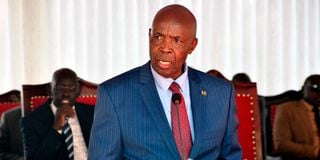Report proposes PSC to lose power to hire university vice chancellors

Cabinet Secretary for Education Ezekiel Machogu.
University vice-chancellors and their deputies will no longer be hired through the Public Service Commission (PSC) in changes proposed in the Presidential Working Party on Education Reforms (PWPER) report that is set to be launched this week.
The proposal is among changes that will necessitate amendments in the Universities Act. The report is expected to be launched by President William Ruto. It also recommends harmonisation of the top managers’ salaries which vary across universities. The issue of the VCs pay has been a topical issue and even the President waded into it last week.
“I have instructed the SRC that there are parastatals and universities where the vice-chancellors and the MDs earn more than even the President. I want to know what those people do,” Dr Ruto said when he announced a pay raise for civil servants.
Currently, VCs and DVCs positions are advertised by the PSC which also conducts interviews before presenting three names of the most successful candidates to the university council. According to the Universities Act (2012), the council then recommends for the appointment of VCs, DVCs and principals of constituent colleges. The appointment is then made by the cabinet secretary for education. A VC of a university is appointed for a term of five years and is eligible for reappointment for one more term depending on their performance.
The PWPER has also proposed that the State considers writing off debts public universities owe statutory bodies. Cumulatively, the debts amount to Sh60.6 billion in staff pensions and statutory deductions such as Pay As You Earn and National Hospital Insurance Fund. The figure has been growing monthly due to interest.
New funding model
Public universities will from September adopt a new funding model that seeks to fix the financial crisis they are currently in. The model will however only affect the First Year students but not the continuing students.
More changes in higher education will affect teacher training where the PWPER proposes that the colleges operate under one college in a model similar to that of the Kenya Medical Training College (KMTC). The 34 teacher training colleges will be transformed into campuses of the Kenya Teacher Training College.
Further, teacher training will be moved from the Basic Education department at the Ministry of Education to the Higher Education Department. The task force has also recommended that the admission criteria currently used for teacher training be revised to allow more students access training. All TTCs are currently under-enrolled since the government made changes in 2021 requiring students to have a minimum mean grade of C (plain) in the Kenya Certificate of Secondary Education.
The proposed changes will also do away with the subject clustering used to admit students to the diploma in primary teacher education. Students are required to have a C grade in all the cluster subjects and also the same in English, Kiswahili, mathematics, a humanity and science subject, a combination that has proved hard to strike. There are currently, 3,922 students enrolled in TTCs against a capacity of 26,650.
Lower entry grades
The PWPER has also proposed affirmative action in admission of students from marginalised regions to TTCs. Such students will be admitted on lower entry grades in an effort to train more teachers for the regions which are poorly staffed and unattractive to many teachers. Placement of students for both the KMTC and teacher training will be through the Kenya Universities and Colleges Central Placement Service.
To effect most the changes proposed by the PWPER, Parliament will be required to amend the various statutes that will be affected. These include the Universities Act, the Basic Education Act, the Teachers Service Commission Act, the Kenya National Examinations Act as well as the Intergovernmental Relations Act.
The amendments were recommended by the legal sub-committee of the PWPER. There was feeling in the taskforce that certain legal complexities have hampered operations in the education sector, especially at the Ministry of Education.





